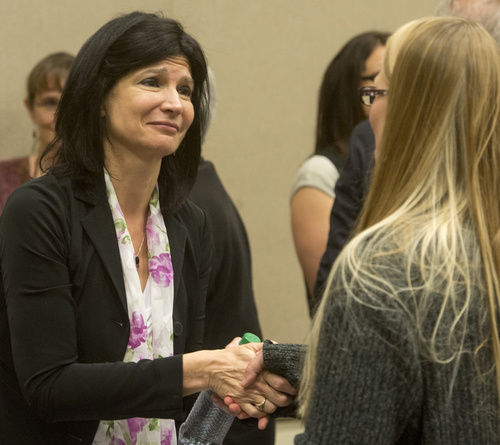This is an archived article that was published on sltrib.com in 2014, and information in the article may be outdated. It is provided only for personal research purposes and may not be reprinted.
If you wanted a reliable medical opinion, you would ask a doctor, not a politician or pundit. If your car needed a tune up, you'd go to a garage, not a grocery store. And if you were looking for strategies to improve your community, you would start at home!
That's why we believe the best ideas for transforming Utah's public schools come from educators right here in Utah, not politicians or self-appointed experts who have little or no experience in classrooms.
In our combined 70 years working in classrooms, lunchrooms and public education, we've learned that our students do better when policymakers listen to those who know best: teachers and education support professionals. Nobody is more passionate about ensuring that there is a great educator in every classroom than teachers, and nobody fights harder for the resources our students need and deserve. Together with parents, educators have led the effort to secure adequate and equitable funding for our schools.
We are not just teachers, we're Utah teachers, and we are proud that our state's educators are on the frontlines, creating new models for reform that is centered on student success. Our members are working with parents, school administrators and policy-makers to make real changes for our students.
This starts with ensuring that there is a highly effective teacher in every classroom. Our members have worked with district and state officials to create and implement new standards for teacher evaluations, which will take full effect next school year. Our new evaluations bring parents, students, school administrators and colleagues into the teacher evaluation process.
The Utah State Office of Education has developed a pilot evaluation system with input from Utah Education Association members, which school districts will be free to adopt or adapt. Each district evaluation system must include observations of a teacher's instructional and leadership quality, evidence of student growth, and input from parents and students. As always, the details are important — which is why it's so critical that the voices of teachers continue to be heard as districts fine-tune their evaluation systems.
Once implemented, these evaluations will be meaningful and comprehensive. Every educator will get feedback and support to help improve teaching practice. When educators need improvement, we must work collaboratively to provide the resources to help them succeed. And when they don't improve, they'll be held accountable.
Utah teachers also have advocated for new standards for entry into the profession, to ensure that every teacher is classroom-ready on day one. Finally, we are working to promote educators' lifelong learning and continuous professional development. It is critical for our students' success that our teachers have the resources to grow in their profession, learn and master new techniques, and collaborate with master educator colleagues. Utah educators — including support professionals — are leading the way in all of these efforts.
As parents across this great state know, most of these good changes don't originate in Washington. They aren't the result of some state or federal mandate, but they start at the local and school level, where parents and teachers work together, sharing ideas and strategies to help students succeed. Parents trust teachers because they know that we put students first. That's why we're so proud that our Utah educators are stepping up, taking the lead, and creating real student-centered reforms. We take our lead from them. It's inspiring. It's important. We hope you will join us.
Lily Eskelsen García, a former Utah Teacher of the Year, is president of the National Education Association. Sharon Gallagher-Fishbaugh, also a former Utah Teacher of the Year, is president of the Utah Education Association.



